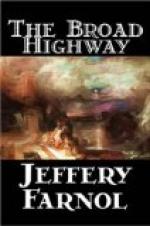“Wheer away, Peter?”
“To the forge; there is much work to be done, Ancient.”
“But Jarge bean’t theer to ’elp ye.”
“Yet the work remains, Ancient.”
“Why then, if you ‘m goin’, I’ll go wi’ ye, Peter.” So we presently set out together.
All about us, as we walked, were mute evidences of the fury of last night’s storm: trees had been uprooted, and great branches torn from others as if by the hands of angry giants; and the brook was a raging torrent. Down here, in the Hollow, the destruction had been less, but in the woods, above, the giants had worked their will, and many an empty gap showed where, erstwhile, had stood a tall and stately tree.
“Trees be very like men,” said the Ancient, nodding to one that lay prone beside the path, “‘ere to-day an’ gone to-morrer, Peter—gone to-morrer. The man in the Bible, ’im as was cured of ’is blindness by our blessed Lord, ’e said as men was like trees walkin’, but, to my mind, Peter, trees is much more like men a-standin’ still. Ye see, Peter, trees be such companionable things; it’s very seldom as you see a tree growin’ all by itself, an’ when you do, if you look at it you can’t ’elp but notice ’ow lonely it do look. Ay, its very leaves seem to ’ave a down-’earted sort o’ drop. I knowed three on ’em once—elm-trees they was growin’ all close together, so close that their branches used to touch each other when the wind blew, jest as if they was a-shakin’ ‘ands wi’ one another, Peter. You could see as they was uncommon fond of each other, wi’ half an eye. Well; one day, along comes a storm and blows one on ’em down—kills it dead, Peter; an’ a little while later, they cuts down another—Lord knows why—an’ theer was the last one, all alone an’ solitary. Now, I used to watch that theer tree—an’ here’s the cur’us thing, Peter—day by day I see that tree a-droopin’ an’ droopin’, a-witherin’ an’ a-pinin’ for them other two—brothers you might say—till one day I come by, an’ theer it were, Peter, a-standin’ up so big an’ tall as ever—but dead! Ay, Peter, dead it were, an’ never put forth another leaf, an’ never will, Peter—never. An’, if you was to ax me, I should say as it died because its ‘eart were broke, Peter. Yes, trees is very like men, an’ the older you grow the more you’ll see it.”
I listened, It was thus we talked, or rather, the Ancient talked and I listened, until we reached Sissinghurst. At the door of the smithy we stopped.
“Peter,” said the old man, staring very hard at a button on my coat.
“Well, Ancient?”
“What about that theer—poor, old, rusty—stapil?”
“Why, it is still above the door, Ancient; you must have seen it this morning.”
“Oh, ah! I seed it, Peter, I seed it,” answered the old man, shifting his gaze to a rolling white cloud above. “I give it a glimp’ over, Peter, but what do ’ee think of it?”
“Well,” said I, aware of the fixity of his gaze and the wistful note in his voice, “it is certainly older and rustier than it was.”




